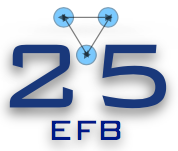Speaker
Description
Resonances in open quantum systems have been actively studied since the very birth of quantum mechanics [1,2]. Their linewidth broadenings caused by the finite lifetimes can be analytically estimated only in a few particular cases [3]. In this sense, the analytically estimated linewidth broadenings of the electron-impurity resonant states by Monozon and Schmelcher [4] is a remarkable theoretical result which can be used as a reliable reference for qualitative estimations [5].
In the current report, using the complex-scaling calculations as a quantitative insight, we show how the qualitative theoretical estimations made by Monozon and Schmelcher for the electron-impurity in very narrow quantum wells (QWs) can be improved and generalized to more practical case of the QW widths of order of the electron-impurity's Bohr radius [6]. In particular, we show that discovered by Fano [7] and confirmed by Monozon and Schmelcher the fourth-power scaling of the linewidth broadenings with respect to QW width holds only for very narrow QWs which are hardly be practically used in the spectroscopy of heterostructures [5]. In contrast to [4], we analytically and numerically demonstrate that for the real QWs the scaling of the linewidths with respect to the QW width appears to be linear. As a result, our studies shed light to the linewidth broadenings in the regimes inaccessible by the Fano theory of resonances. Moreover, many calculated resonant states of electron-impurity and electron-hole pairs in semiconductor QWs as well as their dependencies on the QW width as a parameter allow us to study formation of the exceptional points as a degeneracy of resonances in such systems [8,9].
[1] G. A. Gamow, Z. Physik 51, 204 (1928).
[2] N. Moiseyev, Non-Hermitian Quantum Mechanics (Cambridge University
Press, Cambridge, 2011).
[3] K. Rapedius, Eur. J. Phys. 32, 1199 (2011).
[4] B. S. Monozon and P. Schmelcher, Phys. Rev. B 71, 085302 (2005).
[5] P. A. Belov, Physica E, 112, 96 (2019).
[6] P. A. Belov, Phys. Rev. B 105, 155417 (2022).
[7] U. Fano, Phys. Rev. 124, 1866 (1961).
[8] M. Feldmaier et al J. Phys. B: At. Mol. Opt. Phys. 49, 144002 (2016).
[9] P. A. Belov, Semiconductors 53, 2049 (2019).

